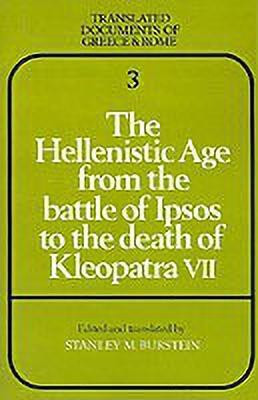The Hellenistic Age from the Battle of Ipsos to the Death of Kleopatra VII(English, Paperback, unknown)
Quick Overview
Product Price Comparison
Greek and Roman history has largely been reconstructed from the works of Herodotus, Thucydides, Livy, Tacitus, and other major authors who are today well represented in English translations. But much equally valuable documentary material is buried in inscriptions and papyri and in the works of Greek and Roman grammarians and scholars, and less well known historians and literary figures, of whose writings only isolated quotations have been preserved. Translated Documents of Greece and Rome has been planned to provide, above all, primary source material for the study of the classical world. It makes important historical documents available in English to scholars and students of classical history. The format of the translations is remarkable in attempting to reproduce faithfully the textual difficulties and uncertainties inherent in the documents, so that the reader without a knowledge of classical languages can assess the reliability of the various readings and interpretations. The author's purpose in compiling this book is to help the teaching of Hellenistic history at undergraduate and graduate level by providing students and teachers with a representative selection of accurately translated documents dealing with the political and social history of Greece and the Near and Middle East from c. 300 to c. 30 BC. The continuing vitality of the Greek cities in the Hellenistic period and the interaction of Greek and non-Greek cultures in the Near and Middle East after Alexander are the two themes to which the author pays particular attention. In accordance with the principles of this series, selections from readily available major authors such as Polybius and Plutarch have been excluded except where unavoidable. Instead the bulk of the selections have been drawn from papyrological and epigraphical sources, many of which have never been translated into English before. The texts include city decrees and regulations, royal letters and ordinances, records of embassies and judicial decisions, dedications, treaties, statue bases, and documents dealing with the establishment of festivals, dynastic and other religious cults, education and other endowments. Brief commentaries and bibliographical notes accompany each text. Students and teachers of ancient history and classical civilization will welcome this book. Those studying Jewish history and the historical background of early Christianity will also find it interesting.


